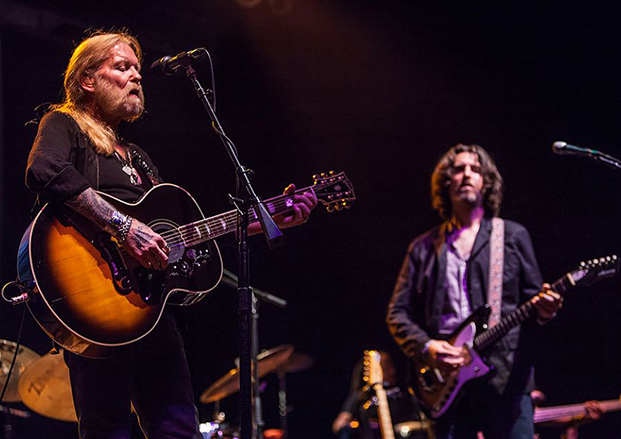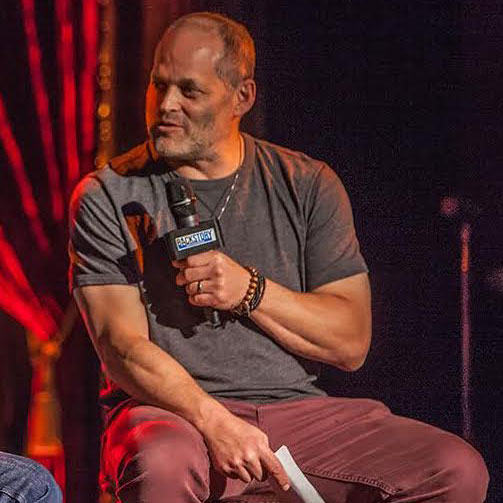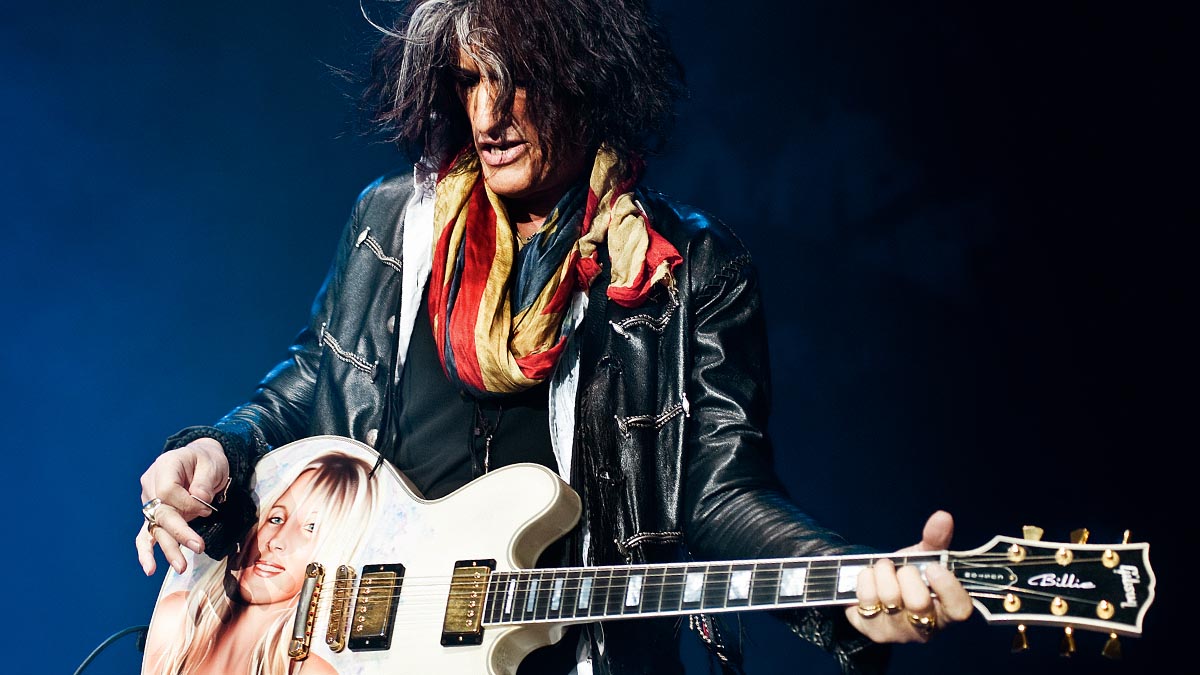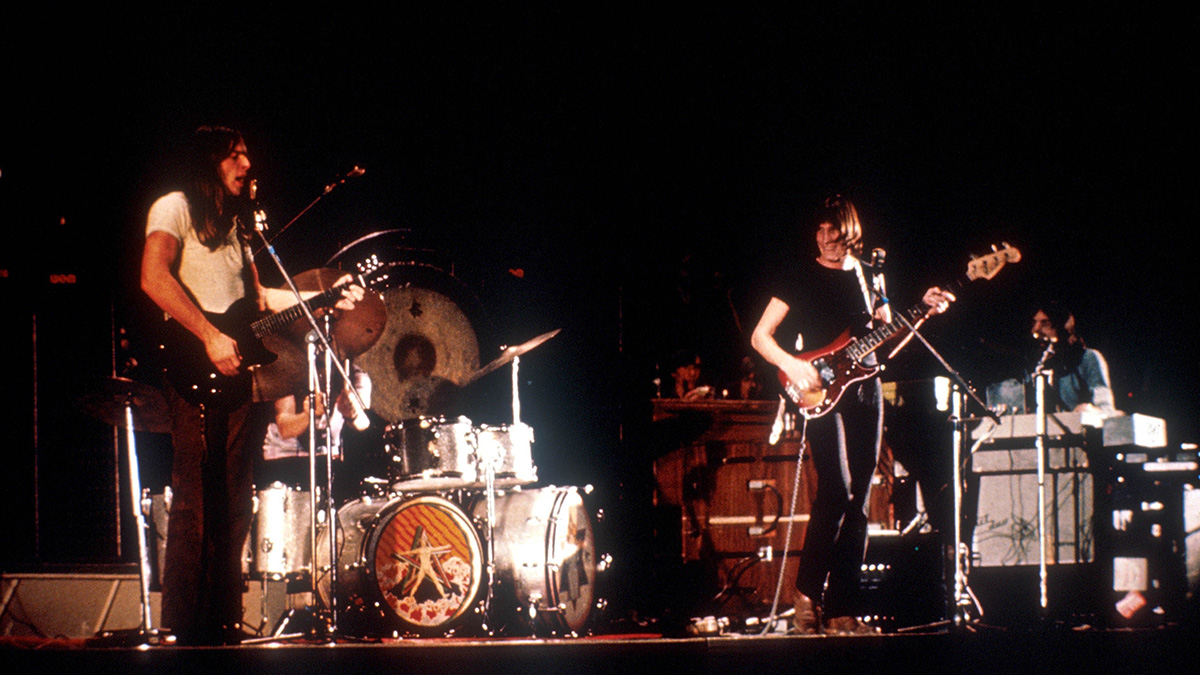
Scott Sharrard joined Gregg Allman’s band as guitarist in 2008 and became its Musical Director in 2014. His first run as MD was at the Macon Opera House, shows captured on the Back To Macon, GA live album and DVD.
“We had been spending a lot of time writing together, developing this relationship as collaborators and he determined that the best way going forward was for me to be his MD,” Sharrard said.
Over the last few years of Allman’s life, he and Sharrard became increasingly close. Sharrard was behind the only two original songs on Allman’s final album, Southern Blood, which is being released Friday, September 8: he wrote “Love Like Kerosene” and the two co-wrote ”My Only True Friend,” the lead single, a profoundly moving farewell.
In a recent conversation, Sharrard went deep on the origins of that song, his relationship with Allman and how Southern Blood came to be. The album was recorded at Fame Studios in Muscle Shoals, Alabama, where Duane Allman first made his mark as session musician working with Wilson Pickett and others. Don Was produced the album.
Gregg was diagnosed with liver cancer in 2013, but almost no one knew about it. When did you find out?
He was doing his second–to-last Allman Brothers run at the Beacon [in March 2014] and I went over to his hotel for a writing session. We had been working on “My Only True Friend” and we were trying to come up with a pre-chorus. He sat me down and told me this news about his terminal illness and I said, “Look Gregg if you want to work, we can work. But we can take the day off, too.”
And he said, “No, this is the time to work.” And that’s when he changed the line to “I hope you’re haunted by the music of my soul when I’m gone.”
Get The Pick Newsletter
All the latest guitar news, interviews, lessons, reviews, deals and more, direct to your inbox!
Wow. What a heavy moment. Can you describe the process of the songwriting before and after that?
The song started about six months before that when I was at his house for a songwriting session and I had a dream where Duane was talking to Gregg. I woke up, ran downstairs grabbed my guitar and pen and paper and basically got the intro and verse exactly as you hear it on the record. I had the first two lines and the chorus line: “You and I both know the road is my only true friend.”
When Gregg woke up I showed it to him right away and he loved it. We worked on it back and forth over the next few months. And when he shared that diagnosis and he added the pre-chorus line, I realized that what we started writing from a dream I had about Duane giving Gregg advice from the beyond became Gregg saying good bye to everyone as he was going into this battle.
Although I never told Gregg the story of Duane, he could feel I was tapped into his energy. Honestly, that was the magic of our collaboration: as music director, guitarist, songwriting partner and friend, I was basically ferrying him across the end of his career and life. That was kind of my job and it’s all in that song, which we basically wrote together over the last few years.
Did the song fall into place when Gregg added that line that changed the focus to a farewell?
Honestly, we were writing that song right up to the final take. We put it off all week in Muscle Shoals because Gregg kept saying, “The song needs something else.” And [percussionist] Marc Quinones suggested that I write a third verse. I always listen when Marc speaks, because he’s never wrong, so I went back to my hotel and worked on the lyrics and wrote that third verse.
The next day I came into the studio and handed it to him. He read it right there standing in front of the Neumann mic getting ready to cut the song. He sat down, read it again and said, “This is it. Let’s go.” I told the band, “Guys, we added another verse, this is how it’s going to go.” We got the horn arrangement adjusted.
Don made sure everyone was on the same page and then we cut the song you hear on the record. It was literally down to the last minute.
That’s amazing, and it doesn’t sound like that at all. You would never know he hadn’t been singing those words for a very long time.
Honestly, man, it’s one of those recording moments that you can’t explain because they are just magical. We played it a few times live and rehearsed it many, many times and Gregg was never really getting all the way in and I swear to God he inhabited the song as we cut it.
What you hear was a first or second take, cut live on the floor with the band, and he just was inside the song, or it was inside him. He found his home in the song just in time and I’d like to think the third verse helped him. I think the stumbling block was he didn’t see the end of the story and I’m really thankful to Marc for his suggestion, which put me to work.
I was up all night working on different ideas for a third verse and I ended up with: “On and on I roam/it feels like home is just around the bend. I’ve got so much left to give but I’m running out of time, my friend.” It’s the goodbye letter.
Amazing. And it’s an illustration of when desperation and inspiration meet. You think about all the times you can struggle to come up with a line or a verse for months but you nailed that verse perfectly in one night – because you had to.
Thanks. I’ve written hundreds of songs, but over the course of working with Gregg for almost a decade I learned what he wanted to sing: the words he would fall on, the rhythms he liked. It wasn’t always conscious that he was showing me this, but as we were writing that song, he was hipping me to all these turns of phrases he preferred for vocal phrasing.
We were working on two other songs and we actually finished one, which I am going to put on my solo record coming out next spring. We ran out of time and to cut it for this record and honestly the tune didn’t really fit what we were doing. It’s a funky upbeat, twisted blues tune. We actually wrote it before his terminal diagnosis and it really didn’t fit the vibe of Southern Blood, as much as he wanted to do it.
I had really grasped what he wanted to sing and say because I had spent so much time writing with him and he had a very, very specific approach. He knew exactly what he wanted as a vocalist, a songwriter and a lyricist: understanding how to match all those things up and make them fit who he was is the mark of a great interpreter of songs. We’re talking Nina Simone and Frank Sinatra territory.
Right. And it’s fascinating because early in his career he was such a terrific songwriter as well as interpreter and as his songwriting slowed down his interpretive skills grew to the point where everything he sang became a Gregg Allman song. I think that’s partly because he always retained a composer’s sense of song.
Yes. His songwriting would still stand out though obviously with less frequency. He was very gun shy about writing anything. He was a master editor, both as a writer and singer. One of the great things about Gregg was his economy of phrasing when he sings and he brought that into his aesthetic choices. He was extremely critical when it came to “Is this song ready?” Gregg was a guy who saved his bullets.
The other song that strikes me as profoundly emotional is Tim Buckley’s “Once I Was.”
Oh, absolutely! You hit the nail on the head, brother. That’s my favorite track. I think it’s the emotional center.
Gregg told me over 20 years ago about his love of Tim Buckley and I’ve written about it but I didn’t see or hear him discuss it much elsewhere. And I’m just wondering how this came to be, and if Gregg spoke to you or others much about his passion for Buckley.
First of all, thanks for asking about it. It’s easily my favorite song on the record and not a single person has asked about it in an interview! Gregg never talked much about his love of Buckley for whatever reason; you are honestly one of the first people inside or outside the family who knows about it. The story behind how this song happened is very dear to me.
To understand, you have to go back again to the day in the hotel when he told me the news. We’re working through what he shared with me emotionally, we’re writing and playing and we take a break. He picks up the guitar and sings and plays “Once I Was” all the way through and I’m literally crying in front of him. I said, “Gregg, please tell me you wrote that song” and he said, “Oh man, I wish I did. That’s by Tim Buckley.”
And I said, “You’re a Tim Buckley fan?” and he says “Oh yeah” and I just went, “That’s great.” Because my dad is a musician and he used to play Tim Buckley stuff all the time, so we started talking about Tim and his songs and I asked if he had ever played “Once I Was” for anyone and he said, “No, I haven’t.” I asked if he had ever played it live, in a studio, a demo, and it was all, “Nope, nothing.”
And I asked him, “Why don’t you record that song?” and he just sort of went, “Oh, I don’t know” and then we moved on. He didn’t want to talk about it more, but he started warming up with it regularly when we would write and I said “Dude, we’re getting that on one of your records.”
That was a few years before these sessions. When we started talking about songs for the records, I told Don that he had to hear Gregg sing this Tim Buckley song. I said that Gregg might be a little hesitant but we had to make it happen and Don was way into it.
When we got to the studio I saw it had fallen off the docket and I kind of got in Gregg’s face about it and said we had to cut a version. We had rehearsed it with the band at soundcheck. I was determined to cut this song, so we had it ready. Lo and behold, at the last minute he said, “Yeah, let’s do it today.”
And, again, this was the second or third take through, fully live on the floor. Art Edmaiston’s sax solo is gorgeous and it’s just such a beautiful track. He changed the words of the third verse. It’s again a great example of his mastery of interpretation to tell his own story. He makes it rhyme and makes it more Gregg and also changed the whole focus of the song in those last two lines to make it more aligned with where his mind and soul were at that moment and it’s brilliant.
That song was something that he and I shared and I was determined to have him share it with the world. I can’t listen to it yet because I know that song cut really deep for him. It’s still too much.
When you guys were in the studio did everyone know about Gregg’s health?
No. There was a general understanding of his health frailty, but only a few people knew, starting with [Gregg’s manager] Michael Lehman, Chank [Middleton, his best friend] and Shannon [Allman's wife]. He certainly didn’t need to share the terminal diagnosis with me but honestly, I think he thought it was important that I knew so that musically we got the last album dialed in.
He didn’t want to share it widely and that was his decision. There’s a line there where this man’s dying wish was to go on stage and after all he did for rock and roll to help create it and refine it, the least we could do for the guy was to honor his dying wish, right?
Absolutely. And it says so much about Gregg’s devotion to the music and his muse that that was his dying wish! I said to Don and I’ll say to you: what you guys did to help Gregg fulfill this final vision is an amazing thing.
We tried our best. I’m a perfectionist so I still see some of the cracks. I can step back enough to say, “Ok, this was the best we could do under the circumstances we had.” But they were not ideal circumstances. We had a great band, we had Don Was, we had Fame studio and those were great advantages, but everything else about the recording sessions was very challenging, especially having the time to do what needed to be done.
Don’s master stroke was bringing in Jackson [Browne] to sing backing vocals on “Song for Adam.” We were about to lose the track because Gregg never sang the last two lines. Don did a wonderful job editing the take together and bringing in Jackson’s distinct voice gives the song a deeper meaning.
Jackson and Gregg were such good friends and admirers of each other’s work since they were teenagers, I couldn’t think of a better way for the record to come to a conclusion than with a lyric that Gregg always related to through the tragic loss of his brother at a young age. Personally, it reminds me that my greatest hope is that they are together somewhere in the cosmos admiring the grand picture and pulling for all of us that got left behind.
Did it ever feel like a burden to have this knowledge of Gregg’s illness, which would obviously impact you a lot, and not be able to discuss it with anyone?
No. The only thing that was frustrating during that time was the work aspect of it. The implosion of the record industry in the last 20 years really fucked up the bottom line for everybody. What should we have been doing? Writing and recording songs for six months to a year. But the way the economy of being a musician works now and has fucked up everybody, trickling all the way up to Gregg is he had to be on the road to support his operation.
Because of these time constraints, we didn’t get as much original material as I would have liked. Gregg was working on a song with [keyboardist] Pete Levin that was really good and he never quite finished. [Note: Levin recently cut this song in the same Fame studios in Muscle Shoals for an upcoming solo album.] We had several more in various stages and I think there could have been a lot more.
I had spoken to Patterson Hood and Jason Isbell and was trying to get them together with Gregg, which he was really interested in. I was also trying to get Bonnie [Raitt] and Gregg together.
There was a lot of really exciting stuff on the docket and time just ran out of us. Losing those opportunities mostly had to do with his health struggles combined with his touring schedule. It was a lot to juggle. I really don’t have any regrets but if there was anything I could have done differently it would have been that.
But Gregg also really loved to perform and I’m not sure anything would have kept him off the road.
Absolutely!
You mentioned Michael, Chank and Shannon and they really were his core support group, right?
Yes, very much so. Michael Lehman always looked out for Gregg, and Chank is Gregg’s spirit animal. There’s very little we could have accomplished without him. He’s a rock. He was Gregg’s comfort for many years, along with Shannon for the last couple of years.
Shannon is special and she was Gregg’s saving grace, particularly in the last year of his life. She gave him the spiritual and emotional comfort he needed to carry on. It was above and beyond. Gregg was very, very lucky to have Shannon and Chank to ease his suffering.
Every day is step by step when you lose someone you’re close to. With Gregg, I lost a multi-layered human being. He was an icon that I looked up to as a kid. I saw the Allman Brothers when I was 12 and that’s what set me on my path. Then to meet him, play with him, collaborate with him and have him impact my own music… I mean, he used to learn my songs and sing them back to me and listen to my records and bring me into his dressing room and say, “Man, I love this song...” It was like, “What the fuck is going on here?”
It got deeper and deeper and deeper and it was quite a journey. There are very few people who had the privilege to go through what I went through with him, and it all came to a head with Southern Blood. For it to be his final recording and to be a handful of people entrusted to execute the project is… it’s an honor is what it is.
Alan Paul is the author of three books, Texas Flood: The Inside Story of Stevie Ray Vaughan, One Way Way Out: The Inside Story of the Allman Brothers Band – which were both New York Times bestsellers – and Big in China: My Unlikely Adventures Raising a Family, Playing the Blues and Becoming a Star in Beijing, a memoir about raising a family in Beijing and forming a Chinese blues band that toured the nation. He’s been associated with Guitar World for 30 years, serving as Managing Editor from 1991-96. He plays in two bands: Big in China and Friends of the Brothers, with Guitar World’s Andy Aledort.










